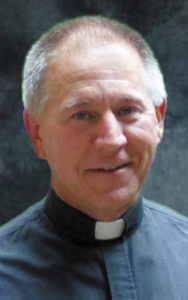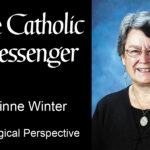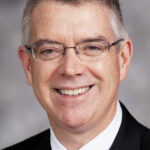By Fr. Bud Grant
“You mentioned … the need to work to prevent further climate change even if it will cost us economically. I think this is misleading and feeds to the common “economy vs. environment” myth. With renewable energy this is no longer the case — we have a lot to gain economically by dumping fossil fuels and diving into the renewable energy and energy efficiency realm. Renewables can also be done in a decentralized way that has the potential to address the environmental justice issues.”
This response to last month’s article is from a friend who spends his life in, and makes a career of, environmental work. He is right. By emphasizing the costs of adaptation and mitigation to new environmental realities, I am inadvertently doing the work of climate change deniers, including members of the not-quite-new-anymore administration that insistently repeats the mantra that the USA will not pursue any environmental practices that are “bad for the economy.”

My friend, let’s call him Ken, cited “This Changes Everything” by journalist Naomi Klein. She argues that international investment in a “Marshall Plan” for the environment will result in “societies that are safer and fairer … [and] the resources required … could pull huge swaths of humanity out of poverty” (p.7). Ultimately, investment in doing the right — and necessary — thing to protect creation and the viability of humanity is also economically transformative.
Klein observes that every significant social movement since Abolitionism has been resisted by ideologues, not only on pseudo-moral and reprehensibly perverse religious grounds, but also — and most successfully — in economic terms. Freeing slaves was perceived as bad for the economy. Civil Rights? Feminism? Immigration? All were perceived as bad for the economy. Klein asserts that, as with other social ills, addressing climate change could “bring jobs and homes and clean water…” (458). Klein is reflecting, if not citing, Pope Francis’ insistence that we have one crisis that is both social/economic and environmental. Others agree: “urban growth … [can] be managed in a way that improves the economic performance … and the quality of life of those who live in them (cities and countries) – and at the same time reduce its contribution to climate change” (Cities and the New Climate Economy, 11.14). Point taken.
Yet Klein adds that “when it comes to the political and economic consequences … specifically the deep changes required … to the underlying logic of our liberalized and profit-seeking economy” climate change deniers “have their eyes wide open” (44). Transforming to a green economy will be slow, painful and expensive. Whole industries will be lost.
We shouldn’t think about job loss and creation as if it were a zero-sum game, as if a coal miner can morph into a hydroponic tomato farmer. For each one who is able to leap onto the transformative economy du jour (that of Mesopotamia, Detroit or Silicon Valley), other ones are left behind: those near retirement; those with non-transferable skills; and especially minority, marginalized and poor laborers. “Sometimes — often — economic growth happens without broad benefits. And that means we have to actually be intentional in bringing everyone along, in connecting poor communities to transportation, or unemployed men to job training, or minority children to better education” (Emily Badger, Washington Post, 2.2.16).
This is the moral and religious premise behind my initial, albeit poorly articulated, assertion that there are economic, nay, human costs to saving the planet and our future. To ensure justice, those of us who have been the “winners” in an extractive economy really must shoulder more of the burden now yoked to the economically disenfranchised. This includes bearing up the dignity of the coal miner, the day laborer, the service provider as our sister and brother. Suffering triggered by the necessary transformation is unavoidable but could be transformative … not just of the economy or even ecology, but of human communities. Perhaps the most valuable discovery is that we are, quite literally, all in this together.
(Father Bud Grant is a professor of theology at St. Ambrose University in Davenport.)











